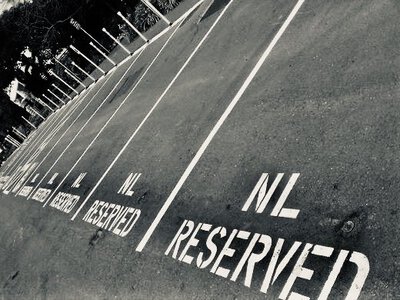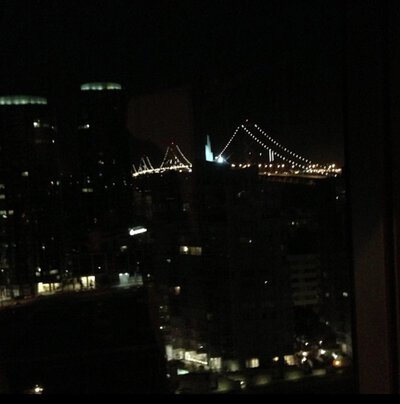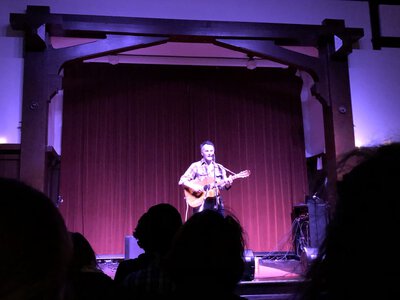This is page 4 of 5. Use the widget below, or go to the previous or next page, or view all combined:
Song #61: How Blue Can You Get
Artist: B.B. King
Date: May 18, 2020
Listen
Permalink
It was the sort of scene you couldn’t conceive of in a post-COVID world. Dozens packed into a literal cave, two steep stories down from the bar’s main entrance. 200 square feet, and that’s being generous; stone in all directions, minimal airflow, ceiling low enough to touch. Pints of Falcon and Carlsberg sloshing in the air as the singer wails into a microphone inches from your face. He’s been downhearted, baby, since the day you met.
We’d met up in Stockholm the previous morning. It was the start of a tradition, though I didn’t know it at the time: Hanging out with my dad in a foreign country at the beginning or end of an unrelated trip. Munich for a conference –> meet in Casablanca; London for business –> Scottish getaway. Sometimes it’s a coincidence of our business travel schedules—we once missed each other in Tokyo by about 25 minutes, having been separately booked in the exact same hotel—but the spirit, like the concerts, boils down to an excuse. Pick a destination, find a reason it makes sense (“My company shouldered the bulk of the flights,” “I have miles to burn before January”). Doesn’t need to be a good one. It’s better if it isn’t.
The family was flying to Heathrow that Sunday, for a weeklong vacation we’d been planning for months: sightseeing in London, a visit to Cambridge, a quick jump to Dublin to give the parents some space. Different factions valued different things, and so the itinerary evolved into a collection of compromises. But this Friday in the basement of a Gamla Stan blues bar wasn’t a part of the itinerary; this was all impulse, improvisation. My dad had spent decades traveling for business, and by my third year of grad school I felt I was catching up. We both wanted an adventure, to go “off the beaten path.” Or least that was the excuse.
I’m not sure we’d ever hung out one-on-one before. Being a twin, the opportunity rarely presented itself. Whether or not this was a literal first, it served as an emotional mile marker. The first time we met as individuals, peers. The first time our meeting felt like a choice. Independent flight logistics, lengthy rambling chats, dinners with drinks that spilled late into the night. We could share in adult adventures, grumble over adult sorts of pain—an inconvenient layover, a project stalling out, a quarter life crisis about whether to stay in school. There were no right or wrong answers, only changes you learned to live with. Fill another glass, lean one palm against the stone, and let the harmonica bend like an unexpected detour.
Baby, how blue can you get?
Song #62: Should Have Known Better
Artist: Sufjan Stevens
Date: May 19, 2020
Listen
Permalink
It was calm on the snow-covered path from the restaurant. No passing trucks or visible pedestrians, a few streetlights flickering from the center of town. Unoccupied cabins. A below-zero breeze. Red and black road signs in the shape of a warning, inscribed with a polar bear’s white silhouette. What appeared in the distance to be an endless expanse was, when your pupils adjusted, not endless at all: It was a glacier, looming over the horizon, received in the darkness as a heavy matte gray. It was jarring like a mirror in a dark room is jarring, and it inexplicably reminded me of Lord Of The Rings—Mordor, the land of the shadow. It was 3pm or midnight, who could really say? In Svalbard in December, the sun never comes.
Darkness has a way of making time disappear, or at least draining from it any semblance of reason. Our five day detour en route to family Christmas had been either an eternity or the blink of an eye. Six hours in Copenhagen between sunrise and sunset: a walk in the rain with paper cups of glögg, a 4pm dinner followed by 12 hours of sleep. Tromsø with its windows of thick, ashen twilight, causing life to be planned in three hour increments: sleep, breakfast, excursion, sleep, lunch, excursion, dinner, sleep. Whale watching, reindeer, a bus to the border, a fever, a shouting match, a book about the Ottomans, pounds of mustard herring in the downstairs buffet, two failed attempts to explain NyQuil to a pharmacist, a sleigh ride that started out charming but quickly felt cruel. Fragments, permuted and dilated in the slush.
Sunlight would resume a day or two later, but the absence of logic would linger. A post-customs argument clinging like a sour aftertaste; Chișinău Christmas all bourbon-soaked smiles; separate flights home, a solitary New Years, the program in New York that cemented her escape. We were floating in contradictions, swirling and dissipating. It was warm, it was frigid, we were together and apart.
I looked up and there it was: The sky iridescent with a green that’s also white, unfolding like a ribbon, like a soap bubble rainbow. Dancing in that murky way a pool’s tiles seem to dance; turbulent beauty, vast, ephemeral. No one there to validate it, no crowd gawking in disbelief, no tour bus full of Nikons trying to buy the perfect shot. There could be no perfect shot. Either a crystal clear darkness or a blurry swath of light. Pick your poison. I lay back in the snow, set the exposure on High, and pointed my iPhone in the direction of the dance—hoping time could lend shape to what a snapshot obscured, an accumulated imprint of a moment in flux.
Illumination
Song #63: The Plan
Artist: Low
Date: May 20, 2020
Listen
Permalink
An evening walk home, laden with silence. Impossible to keep eye contact and that only makes it worse. Open the front door, get on with the thing. Sitting, hunched forward, knees awkwardly grazing, on a couch you promised to replace two years ago. She’s saying what you both know, what you should have said yourself, and yet it feels like something precious being slowly torn apart. You think of petals, whose color could only stay vivid when attached to something living. The inside jokes, the sleigh ride, Christmas with the family. Pluck the past from the future and it’s just a dried out, beige-ish thought.
This song is tied to one memory, but it permeates them all. Pacing out front the sushi restaurant in downtown LA, asking for clarity for the 200th time. Trying not to shout, abysmally failing; a wordless drive home save your venom-laced “goodbye,” the tortured look she gives as you careen into the night. Her waiting on a park bench, the ultimate cliché; there’s even a swing set to brood through the moment you’re alone. A 2am knock on the window, sudden flashlight glare. The officer’s suspicious, but none of it’s a crime: crying into a burrito as the stereo whispers something soft, still parked by the swing set, not ready to face the family yet. You’re allowed to not be ready. Heading to her parents' house to rent some shitty rom-com, hand-written goodbye note burning a hole in your pocket. Idling in the dorm parking lot insisting on Jerry and Elaine. The hallway, the petals, either victim or perp. One of you reeling from a sudden revelation, the other two steps ahead, already grieving what’s been lost.
It isn’t a person you lose so much as a definite future, or a thousand possibilities of where the future might have led. None of them were particularly likely, to be fair, but they all collapse to nothing when you’re handed pieces of the plan. You fight it at first, try to tape it back together: Things will be different now, please let me try. Do it for me. Do it for “us.” Red spirals drawn in Sharpie on the same idealized map, circuitous new routes to old destinations. Look. We can still make it. Trust me. Let’s drive. Knowing even as you say it it’s a futile endeavor, like a salesman hawking products he himself would never buy.
Give it the hard sell if it makes you feel useful, if it makes the ordeal feel like something closer to a choice. You’ve got nothing but time.
On the step you handed me
Pieces of the plan
At the gate you handed me
Pieces of the plan
Can I hold it for a week?
Can I hold it?
Song #64: We Are Fine
Artist: Sharon Van Etten
Date: May 21, 2020
Listen
Permalink
The breakfast buffet seemed to stretch on for miles, but all I could think of was coffee. It was my last day in China and I was tired as hell. My internal clock was in shambles, my stress levels were soaring, and my personal life was still bombarded by ghosts. Reinforcements had arrived to relieve me of my workload, but being alone with my thoughts hardly lent itself to sleep. At this point in life, I could only find comfort in motion. I grabbed a little bowl of congee, a plate of fried rice, some scrambled eggs with kimchi and a side of mustard herring—an international hotel offers too many choices, and again, I was running on fumes. Everything was a mishmash, a pile-on, a wash. Heart decorations strewn through the lobby, posts lobbed at social media to signal Worldly And Fulfilled™. All of it so much gauzy nonsense.
I made a weak attempt at small talk with my breakfast companion, a coworker and translator who met me for every China trip. We talked about her son’s education, the customer’s demands, my direct flight home tomorrow and what a luxury it would be. Like so many conversations, I was only halfway there. Another part of me was scrolling, reconfiguring nonexistent clues.
A stranger tapped me on the shoulder. He’d been watching from a distance and simply had to ask. Was I American? Hollywood? Could I please tell him why I’m here? How old was I? Married? How much longer would I say? He began his first few questions in English, but soon deferred to my companion. She laughed as she translated but there was nothing joking in his affect: He spoke as if it were a duty he’d been reluctant to fulfill. He said he liked my style (hair matted to the shoulders), and my (bloodshot) “bright” blue eyes, and the happiness I carried (I hadn’t used the word in months). He asked if he could hug me; I shruggingly complied. Then he turned around and left the room. I never got his name.
There’s no substance to this story; it doesn’t really mean a thing. You meet characters like this in every city, though I do think being in a foreign country makes you more primed to receive them—more likely to allow certain lines to blur, to enter contexts you don’t know. But that absurd, shared hug on Valentine’s at a Hilton breakfast buffet…it occupies a special place in my heart. I floated through the next 24 hours with a slightly skewed perspective, a more hopeful soundtrack, a conviction that things would be fine. One ghost entered that heart-heavy dining room, multitudes vanished.
Tell me not to trip or to lose sight
You are walking in my guided light
Take my hand and help me not to shake
Say I’m alright, I’m alright
Song #65: Sometimes Always
Artist: The Jesus and Mary Chain
Date: May 22, 2020
Listen
Permalink
I left Stanford at sunrise and headed north. It may seem a strange way to spend Valentine’s Day, driving a hundred miles solo to stand six hours in line for beer. But I was single, between deadlines, and my roommate was out of town. There were worse things you could do to pass the time.
If you’re a hop fanatic, you’ve probably heard of Pliny. Russian River’s flagship double IPA, Pliny the Elder, holds a hallowed place for many even outside of the Bay. But the real treasure is Pliny the Younger, its aggressively fresh, boozy companion brewed exactly once a year. Historically there have been no bottles to speak of, and a small whisper network of taps runs down the California coast. Blink and you’d miss it. To get a guaranteed pour, you needed to head to the source: The brewery and taproom in downtown Santa Rosa. Every year, in early February, the devoted would make the pilgrimage for the promise of a taste.
The previous night, I’d made a playlist for the drive. This was a budding hobby of mine, which probably won’t surprise you—a good number of these entries are culled from those playlists. Order was extremely important to me. The drive needed to follow a precise, nested logic. Songs moved in circles, and those circles moved. On the track-to-track level, things needed to flow: a closing note blurring into an opening bassline, a dangling lyric hinting at an upcoming theme; the blues giving way to a sudden swath of green, one post-heartache Valentine’s to another before it. To ward off highway hypnosis, I threw in small rolling arcs: melancholy, mournful, mellow, upbeat; a rough patch, an ending, a glimmer of hope, a fresh new beginning. Then there was the broad narrative, the overall shape. My formula was obvious, and has persisted for years. The playlist always started with a banger, dipped its toe into melancholy, descended into sorrow, and ended with some triumphant upswing.
Few songs can act as that fourth act hinge, bearing the weight of all that sadness and bending it back towards the light. In the “Mellow Love-ish Songs” playlist of 2014, The Jesus and Mary Chain did all the heavy lifting. Driving across a fog-heavy Golden Gate Bridge, amber light just starting to break in Marin up ahead, propelled by fuzzy distortion and a not-unpleasant loneliness, racing towards a new take on the same old bitter flower.
Oh you’re a lucky one
Lucky son of a gun
You went away but now you’re back
Song #66: Love Steals Us From Loneliness
Artist: Idlewild
Date: May 23, 2020
Listen
Permalink
Payless to the pedal. Caramel latte in the cup holder. 20 minutes left until first period English, and nothing to do but drive, drive, drive. My portable CD player and vinyl booklet were in their proper place, and with them my snobby grudge against all things “mainstream”. But for some reason, I never did listen to my own stuff in the morning. At least not in those early days, when I first began to drive. Every Monday through Friday, without fail, it was 91X or 94.9—FM morning zoo shows and “Alternative Rock.” To this day, that brief window in the mid-2000s remains the only time I’ve consistently listened to the radio.
I’m not sure what locked me into this particular routine. I think it fit a sort of template, a framework of adulthood I’d sketched in my mind: coffee, traffic, FM radio. Sometimes I’d purposely get to school early, just to idle in the parking lot and let the feeling linger. These were the days of Adam Carolla and Tom Leykis, Loveline and The Phil Hendrie Show—ostensibly “adult” discussions about “adult” themes, secrets I’d never been privy to before my time behind the wheel. A brave new world was opening up to me: a girlfriend, a car, a minimum wage job. On my 16th birthday, just after passing my driving exam, I pulled onto the freeway and turned the FM dial. I finally had something I could keep to myself.
So many hits from this period come to mind, burned into the deepest recesses of my psyche: “Fix You,” “The Denial Twist,” “I Turn My Camera On,” “Soul Meets Body,” “Feel Good Inc,” “Float On,” “Chasing Cars,” “Somewhere Only We Know,” “Vertigo,” “Juicebox,” “Phantom Limb,” “The Crane Wife 3,” “Collide,” “Do You Want To.” It was a confusing era of heartfelt stadium rock, of prickly artists tactically sanding down their edges and once intimate indie faves blowing up their sound. Everyone drawn inexorably toward the Snow Patrol Asymptote, which had itself been chasing the hipster culture it now pulled:
Put Sufjan Stevens on
And we’ll play your favorite song
The song that really gripped me in those first days on the road was by a group I’d never heard of—whose album I would immediately go on to buy at the local FYE, using savings from the birthday cards that still were trickling in. It laid out a different sort of template, which I followed to a T.
You said something
You said something stupid, like
‘Love steals us from loneliness'
Happy birthday
Are you lonely yet?
Song #67: Let’s Not Shit Ourselves (To Love and to Be Loved)
Artist: Bright Eyes
Date: May 24, 2020
Listen
Permalink
In March 2007, I received the best present of my life: a letter of acceptance to UC Berkeley. Despite my solid grades, I hadn’t been particularly imaginative when it came to higher education. The only colleges I applied to were two Cal State schools and three UC’s. Nothing private, nothing out of state. Berkeley was as distant, as big as I could dream.
I loved the campus from the moment I laid eyes on it, and it remains to this day one of my favorite spots on earth. When I moved on to Stanford, the change of scenery depressed me by comparison. It was idyllic, like a painting or some vast outdoor museum, but who wants to spend their early 20’s being afraid to touch the glass? It felt totally devoid of vitality, of culture. Whereas Sproul Plaza at Berkeley was Grand Central Station: students, professors, protestors, buskers, incoherent street preachers with Googleable names. It felt exactly like what Hollywood taught me a university should feel like—a melting pot, a sharpening stone, a place that demanded inner change.
Autumn was my favorite season. Grey clouds, falling leaves, shivery bay gusts. It was an excuse to wear jackets and read self-reflexive novels (A Heartbreaking Work of Staggering Genius, If on a winter’s night a traveler), to give my best Dustin Hoffman impression in some Ginsberg-soaked cafe, or to try my hand at Richard Brautigan in a cozy patch of grass. On my breaks in between classes, or in aimless evening hours, I’d repeat the same routine: Grab a cup of coffee from the Free Speech Cafe, fire up the 4th gen iPod I inherited from my dad, and wander.
Per university cliché, I spent a lot of those walks pondering The Big Questions. My courses conspired to help. Physics: Was I a free agent or some predetermined mass? Computer Science: Was I more than the sum of my inputs—my upbringing, my surroundings, the influences I emulated? Symbolic Logic: How could I prove this shit? Philosophy: Was it a waste of time to try? It’s the sort of territory you can lose yourself in, like some mental ouroboros. Meaninglessness as self-fulfilling prophecy.
When I waded in too deep, art became my lifeline. Films reminded me that present beauty could trump future uncertainty. Literature taught me that questions, properly framed, could be more potent than their answers. And music insisted I keep my priorities in check. On those moody strolls when the sharpening felt unbearable, I would hush the inner voice and let my headphones do the talking.
But where was it when I first heard that sweet sound of humility?
It came to my ears in the goddamn loveliest melody
How grateful I was then to be part of the mystery
To love and to be loved
Let’s just hope that is enough
Song #68: Joan of Arc
Artist: Jennifer Warnes (cover of Leonard Cohen)
Date: May 25, 2020
Listen
Permalink
We were halfway through Orange County; it was the journey’s final stretch. Me at the wheel, my dad in the passenger seat, twin brother dozing in the back. So much had happened in only 36 hours. First the pre-dawn race up the Grapevine, the speculative tour of UC Berkeley, the lunch at a Pakistani joint whose menu I’d memorize within the year. Then the missed turn for Watsonville, the windy road west of nowhere, the five hours of sleep before taking the coastal route to San Louis Obispo. Showing up 45 minutes late to Cal Poly visit day and catching our breath while emoting satisfaction—"It’s affordable and it’s close to the beach!“ exchanged among parents like a handshake, a prayer—before a quick lunch and a sprint to be home in time for dinner.
My time behind the wheel marked a new personal record. At 295 miles in a single go, this was easily the furthest I’d driven to date: tripling Disneyland, doubling Six Flags, to remain undefeated until Song 11’s road trip later that year (when a 12 hour slog from Vegas to Boulder would blow it out of the water). No one was keeping score, and yet I remember it as a competition, as crucial evidence of something. Ordering chicken tikka masala with garlic naan and lassi, locating Route 156 on a Thomas Guide atlas, being the first to guess what “NL” meant in the faculty parking lot, asking for my own key at the hotel like a veteran business traveler, lobbing clever-sounding questions at the tour guide in SLO. I was an adult. I could be depended on. I could drive four and a half hours and not even get tired. I was ready for whatever came next.
The sun was starting to set, and with it came the symphony of flickering headlights. On the coastal route my brother and I had manned the stereo, giving my dad a quick lesson on Pitchfork-approved groups—Belle and Sebastian, Of Montreal, certain eras of Wilco. Now, the tables had turned. We’d done The Who past Pismo Beach, Three Dog Night via Santa Barbara, The Beach Boys from Ventura through the whole length of LA, and now we were closing in on Leonard Cohen by way of Jennifer Warnes. Her album of covers, Famous Blue Raincoat, had just turned 20 years old. I remember synth booming down the interstate in the opening tracks, seemingly timed to the rhythm of the exit signs: first we take Manhattan Beach, etc, etc…
Route 91 passed on the left, and Disneyland, that old contender, was rapidly approaching. One voice rose to meet the other, marking the transition to a future cruel and bright.
Now the flames they followed Joan of Arc
As she came riding through the dark
No moon to keep her armour bright
No man to get her through this dark and smoky night
Song #69: Ghost Of A Good Thing
Artist: Dashboard Confessional
Date: May 26, 2020
Listen
Permalink
I remember the first time I called her house. It was a little after midnight and her parents were asleep, but at 13 years old I saw no other options. After hours of AIM therapy and a few nonspecific threats, she’d logged off with the words “I’m sorry, I can’t.” Of course it would read as betrayal, me calling her parents. But if I wasn’t willing to risk losing her trust, did I really deserve to keep it?
L and I met in the Junior High group at church. At first blush, she was the sort of girl who might have coasted through adolescence: conventionally attractive, popular at events, a singer in the worship band, toothy smile, easy laugh. But slowly, through months of online chats, she started to let me in. The inner reservoir of sadness, the nights she couldn’t seem to shake it. Morbid thoughts eliciting giggles that scared her; songs that made the tears well up unwanted, unannounced. I soon learned to infer it: cat scratches peeking through unseasonable turtlenecks, little wristbands she’d snap to keep the creeping thoughts at bay, jokes that didn’t really seem like jokes.
There’s no other way to say it: I loved L. She may be the first person in my life I made the conscious choice to love—not a family member or childhood friend where love was the assumption, but someone I met on my own terms, for whom nothing was assumed. She was under no obligation to reveal herself to me, yet here we were, writing late into the evening, revealing. My love wasn’t romantic, but it was intimate, urgent: I needed to protect her, to honor her vulnerability, to give as much of myself as she had given me. I mined my life for sorrow, for shameful secret truths, confiding things in L I’d never tell another soul. Maybe it was a bargaining chip, though I didn’t see it at the time—if I share more she’ll reciprocate, and if she reciprocates I can save her, and if I save her it will prove that I’m the sort of guy who could.
No one ever told me what happened, that first night that I called. Her mom answered the phone, I suggested she knock on the bedroom door, she thanked me and hung up. Two weeks of the silent treatment and I was back in L’s good graces. Did I help? Did it matter? I couldn’t assess the level of danger any more than I could categorize my love: Everything was a 10, filtered through the boundless self-seriousness of teenage emotion. Then again, maybe that’s why I could recognize what parents, pastors couldn’t. I took her at face value. I let her sadness be a 10.
On the bad days, I’d bike to her house and her mom would make us sandwiches. Then we’d retreat up to her bedroom, trusted to be alone, passing hours with our music and our mission and our scars.
Maybe it’s love, but it’s like you said
Love is like a role that we play
Song #70: She Will Be Loved
Artist: Maroon 5
Date: May 27, 2020
Listen
Permalink
It was nearly showtime. I was on acoustic guitar, L on vocal duty. Our high school church group had just kicked off their Friday Night Cafes, evenings when we’d gather on the patio with packets of hot chocolate and listen to music. Tonight was open mic night, and we’d somehow talked ourselves into performing. I was nervous as I sat with her on the bench around the corner, my trembling fingers trying to work the faux bossa nova pulse.
There’s no direct line connecting this story to yesterday’s. Our friendship didn’t ebb and flow, so much as sporadically vanish and reappear. There was the summer between junior high and high school and the new people who filled it, the edgy boyfriend she intuited I didn’t want to meet, the relationship I’d spend a year neglecting everyone to cultivate, the mutual friends' breakup that demanded choosing sides. L flitted in and out of my life, always weightless until the moment she wasn’t. Whenever she appeared the old bond would resume, and with it an avalanche of memories. Sitting in my front yard for what seemed to be hours, tears running down my shoulder as the sprinklers took their cue, aware of my parents watching through the window and her own in the station wagon just around the block. Salt, snot, and berry body lotion; mud and fresh cut grass. Her fainting as she opened the goodbye note her boyfriend left us, me just barely catching her and setting her down before running with a conviction I’ve never felt since. Her dad fiddling with the radio as we drove down to the hospital; the muted colors of her nightgown as she joked about the food; yellow plastic chairs right out of Mrs. Serry’s preschool; tiny elephants in the visiting room sans shirtsleeves or excuses, scattered story arcs too subtle for the fluorescent, sterile glare. Awkward confrontations, unnecessary fights, nights I saw her inbound messages but chose to look away. Confessions I swore I’d keep secret and will, anonymized or no. Even disparate lines deserve to be honored.
Tonight we were honoring them, or at least we meant to. This is one of the last times I remember us speaking, save the odd birthday text every 5 or 6 years. Her soft vocal warmups with the still-unbroken smile; my fidgeting with the capo, trying to find the perfect key.
We never did find it. I made some excuse for us not to go on stage, and she opted instead for an a cappella ballad. I watched from a distance, taking sips of hot cocoa, my heart filled with something like pride.
Tap on my window
Knock on my door
Song #71: Teenage Spaceship
Artist: Smog
Date: May 28, 2020
Listen
Permalink
The Bay Bridge at night emits a low frequency hum. In the thick of it, it’s chaos: a screeching tire, a road rage honk, a brake pad on its deathbed. But received from a distance it irons itself out, the predictable pitch of a thousand accumulated choices. When the others go to bed and you turn out all the lights, you can press your face up to the glass and marvel at the machine. Spectral grooves of orange, yellow, red; an unbroken line from here to Yerba Buena, straight save the dimples of “temporary” construction. Temporary in quotes, because it’s a perpetual presence. The crews and cones may migrate, but they never leave the bridge. However long they work at it, there’s more left to be done.
In the early days of the company, we had neither funding nor employees. We were four co-founders in total, two in Europe, two SF. Our SF “office” was a South Beach apartment, 19 stories high and overlooking the bridge. The first time I visited, I felt on top of the world—the view, the nightlife, the constant sense of motion. Six months in and I was a permanent fixture, spending 4+ nights a week there with the CEO and his wife. Their due date was rapidly approaching, and my temporary bedroom housed a Diaper Genie and a crib.
Hindsight casts this era in a cool, nostalgic glow—that “due date” is now a six-year-old girl who knows more facts about the Warriors' 2018 roster than I do my own family—but at the time it was a frenzy. We’d been dipping into savings for months, getting nowhere. We couldn’t justify it long after the baby arrived. Pitch to investors every morning, code late into the night, take a break to watch The Office when we were ready to call it. Michael would learn nothing, the credits would roll, the couple would head to bed, and I’d have the living room to myself.
I was always exhausted, but I couldn’t will myself to sleep. On those nights I’d crack a bottle of something stiff, turn the kitchen lights down low, and play contemplative music as I took stock of the machine. Give it a few months and I could be just about anywhere: managing a team of engineers in a non-residential office, vesting and resting after some panicked acqui-hire, back from “leave” at Stanford with my tail between my legs. The possibilities were endless, and I felt I owned them all. Disparate destinations, unanticipated exits, chaotic swerves for time to smooth into a narrative arc. Tragedy or triumph, at least there’d be a story. Something unambiguously mine.
I was beautiful with all my lights
Loomed so large on the horizon
So large
People thought my windows were stars
Song #72: Down Down The Deep River
Artist: Okkervil River
Date: May 29, 2020
Listen
Permalink
“You’ve been typing for hours. Can I ask what you’re doing?”
“I’m writing a short story.”
“What’s it about?”
“Well, it’s pretending to be about this—traveling alone in a foreign country—but it’s actually about memory. There’s this narrator who acts like he’s describing a place to you, when what he’s really describing is a certain lonely feeling.”
“So you’re a writer then?”
“I’ve never tried before, but today…I guess? Sorry, I don’t mean to be rude, but I’ve gotta get this down.”
She raised her Singha and I raised mine in kind, then I turned my attention back to the screen. When I’d sat down I’d only had the barest hint of an outline, frantic bullet points jotted down on the previous night’s flight in from Tokyo. Now I was five pages in (littered with half-sentences and typos), with a conclusion fast approaching like an oncoming train.
I only had 24 hours to sightsee in Bangkok. I’d flown in a day early to share a night on the town with a pilot based in Hong Kong who’s crashed a handful of these trips. After cocktails, Soi Cowboy, and a hungover brunch, I was back on my own and more or less spent. It was the sort of travel schedule so absurd it liberates you: With no chance of seeing everything, you feel no obligation to see anything. A ride on the riverboat, a walk through Wat Pho—I checked them off the list, found a bar with shade and WiFi, and gave myself a few uninterrupted hours to write.
I lied when I told her I’d never tried it before. Just last month I’d taken a stab at something loosely autobiographical, an E. E. Cummings-soaked piece of prose about a breakup. “You’re too close to it,” a friend said when I asked him to critique it. “It needs more piss and vinegar.” In truth I possessed neither, but that was the freeing realization I discovered on this trip: None of this had to be true. A fictional “I” could grapple with my demons, and he could do so with a clarity I didn’t yet possess. At the time I saw it as an exorcism; today, I see it as time travel. Biff rewriting the almanac.
Sitting in that bar, mining memory for “fiction,” I felt like Andres Serrano with his little plastic crucifix—recklessly rearranging two different sorts of truth. Who I aspired to be and who I really was, swirled into a murky melange. 72 songs into this project, I can’t say much has changed. While these memories are true, or at least authentic recollections, they’re also inevitably clouded by want: unlikely convictions, details I feel but can’t trace, anachronistic soundtracks that are burned into my skull. I used to try and fact check—berry body lotion? were we really drinking Singha?—but I’ve eventually succumbed. Every time machine invokes a paradox or two. You can either let the truth destroy you, or you choose to ride the wave.
Though it’s not all right
It’s so far from all right
We’ll make it into a choice somehow
Song #73: Lies I Chose To Believe
Artist: John Moreland
Date: May 30, 2020
Listen
Permalink
It was going to be fine. It could all be explained. The IPA, the raucous crowd, the abysmal lack of sleep, the ghosts of 70’s cigarettes still clinging to the carpets—there were plenty of reasons I should be feeling what I felt, and plenty of modes to describe it. Dramatic: I was suffocating. Neutral: I was anxious. Jaded: After nearly 30 years I still had no handle on this shit. Lobbing little trial balloons up in the air: “Does anyone else feel stuffy? I’m finding it hard to catch a breath.” Probably allergies, probably nothing—fake a little chuckle, take a casual-looking sip. Dress for the mental health you want, etc, etc. “Hey, I’m beat, maybe it’s time to call it for the night. Text me what I owe you, and I’ll see you in the lobby at 7am sharp!”
Even on a lucid night Vegas can be a nightmare, but sprinting through it mid- panic attack is something else entirely. Fluorescent lights, recycled air, perpetual bleeps and bloops. That nauseating mixture of tobacco and Febreze. The lack of any direction that is visibly “outside.” Breathe in, hold it for a few Mississippis. Breathe out slowly, no, that one was a pant. In, don’t gasp for it, now it’s hyperventilation. The accelerating heartbeat, the dizziness, the sweats—too late to regain balance, better to steer into the skid. I surely wouldn’t be the first person to collapse on the floor of Caesars Palace. They probably had some sort of checklist.
Though I dropped my key card twice trying to fit it into slots, I somehow made it through the elevator and stumbled to my room. Wrestling a bottle of Afrin out of my bag, I took a few deep pulls then turned the shower on hot. I slumped to the tiles and let the steam fill my airways, in through the nose, out through the mouth. The spinning was slowing. I was no longer in danger. I was never in danger. It was over, I lied.
I’ve grappled with panic attacks my entire adult life, but they only ever come when I can afford to ride them out. It’s an oddly sturdy pact between my ego and my id: always a Saturday, never a Wednesday, always after the big presentation, never during or before. A day or two without one and they recede into an asterisk, but when they hit they subsume every aspect of my life—past and present, first and second person, all guardrails get toppled over in the fray. When I’m in the middle of one, I’m in the middle of them all: on the plane from San Diego just after family Christmas; driving to a rugby competition with my roommates in the back; making my CEO pull over after a pitch meeting to hunt for Mentho-lyptus Halls; waking in a cold sweat one night in my early twenties, pondering an eternity I’d recently forsworn; in my hotel in Shibuya after beer and Kobe beef; in the bathroom of the frat house, breathing through the window’s crack; pacing the waiting room, VH1 blaring. Half-remembered fever dreams, connected by fragility. By the temporary lack of the illusion of control.
I talk myself through it till the lie becomes more sturdy. I call Joanna, who softly reiterates it to me. You reiterate me to me. We reiterate, together.
I remember that night in Vegas as a particularly rough one, with aftershocks that tore through the remainder of the trip. But lying in that hotel bed, listening to music, the fear of it did begin to lift. Certain guardrails could wait until morning.
So I’ll shout it out from the heavens above
Hell ain’t nothing but the devil’s drug
And love ain’t a sickness, though I once thought it was
When I was too surrounded to see
The lies I chose to believe
Song #74: Divine Invitation
Artist: Something Like Silas
Date: May 31, 2020
Listen
Permalink
There’s a footpath that winds up the hill from the chapel, just above Dormitory Road. To the left are the boys' cabins, where all your friends are waiting. Straight ahead are the girls' cabins, housing untold secrets. “No purple!” is the slogan, meaning co-ed PDA, but it doesn’t have to be physical to be a wrongful, weighty thing. Sins of the heart are no different in God’s eyes, and even with pure motives, how exactly would it look? A fox in the hen house, teenage wolf on the prowl? Better to avoid a whiff of temptation, at this hour of night, with your hormones all scrambled. Take the narrow path rightward and on to the rock.
It was a full moon that evening at Hume Lake Christian Camp, on a mid-summer Tuesday in 2003. I know it was full because the glare was nearly blinding, and I know it was a Tuesday because these things follow a routine: Sundays are the pep rally; Mondays laying groundwork; Wednesdays a catharsis from the hurt that came before; Thursdays are for Real Talk, always separated by gender, when the girls discuss self-image and the boys re-re-renounce their porn; Fridays are an acknowledgement that all of this is fleeting, that the challenge is maintaining the epiphanies at home; Saturdays are for slideshows and clearing browser histories, struggling to remember how it felt. Only Tuesdays are the Gospel, soliciting repentance. Which explains why I was bawling as the moon shone through the pines.
The arc of the sermon isn’t what hit me—by 14, I’d heard every variation under the [Prodigal] sun. What hit me was my self, my lack of authenticity. When the lights turned purple, the preacher’s prayer faded, and the worship band took their emotional cue, I couldn’t unsee the machine. I had to be crying; I had to be moved. I knelt to the floor, not overwhelmed by the Spirit, but by a conviction that this was how The Good Ones behaved. The more I considered it, the more sweeping it became: Every aspect of my life had been fraudulent, a con. I volunteered for mission trips because I wanted to seem holy; I prayed because I aspired to be the type of kid who would. Everything I strived for, even eternal salvation, was rooted in a craven need for validation, praise. “Well done, my good and faithful servant.” I was hopeless. I was wicked. I couldn’t get out of my own way.
So I sat on that rock, for hours in my memory. I prayed, and I bawled, and I tried to unravel it: I ask, I repent, I plead, I vow, always that cancerous “I” holding court. In hindsight, I see this as a sort of spiritual panic attack. Like the intellectual one in college which reduced consciousness to billiard balls, or the physical one in Vegas which disproved breathing ad absurdum, it’s a cycle of self-awareness which tramples everything in its path. Hold the mic up to the speaker, touch the plus sign to the minus, utter “selfless” in a body defined solely by a self—the only answer is to break the loop before the current overwhelms you.
Eventually, I let myself break it. Maybe this whole dilemma had been arrogance talking; maybe sins of the heart aren’t meant to be so dissected, so observed. Maybe the actions steer the thought life, not the other way around. I apologized in a meta sense, blamed my tears on hormones, and gave myself permission to be present, to be me. In through the nose, out through the mouth.
Sweet, sweet breath of life
You fulfill
With the warmth of Your love
A mystery of Your ways
Song #75: Gronlandic Edit
Artist: of Montreal
Date: June 1, 2020
Listen
Permalink
In undergrad, I adopted the identity of The Open-Minded Thinker. C.S. Lewis and Richard Dawkins occupied the same bookshelf in my dorm. I could quote the points of disagreement between Luther and Zwingli and find any passage of the Bible in 10 seconds flat, but alongside Kierkegaard and Aquinas I fit Nietzsche and Camus. The first time Zarathustra said it, it hit me like a game of spiritual Russian roulette—the adrenaline rush of an unforgivable sin I could hold without internalizing.
I considered myself an independent, which is to say, I was always at least partially wrong. I argued for gay marriage to be legalized immediately, while conceding that it was an “abomination to the Lord.” I proudly voted for Obama, though the “whole pro choice thing” made me admittedly uncomfortable, to say nothing of Jeremiah Wright. I believed in an Intelligent Designer of a 13 billion year-old universe, an Adam and Eve who had descended from cavemen, a literal Noah who weathered a figurative flood, and a Revelation which ended in roughly 70 A.D. I was pure but not Puritanical; I was a Christian, but not like the embarrassing kind you saw on TV. I saved myself for marriage while bragging about fake conquests; I got drunk but never high; I smoked cigars but never cigarettes; I made a frequent point of cursing just to prove it was allowed.
I was dancing with the angels on the edge of Occam’s razor, and that’s exactly the Beat Poet gibberish I’d have deemed brilliant at the time. Dipping a toe into the profane, mingling rational and spiritual, holding two poles of a magnet inside my head at once. The universe was open, and to “embrace the mystery” was just a flowery way of admitting defeat. I could embrace it in my 40's—now was the time to pry it loose, examine it, reduce it to a formula.
Everything had to mean something. A film couldn’t be a film, it had to be a declaration; a song was only worth singing if it was hard to comprehend. These were the days of Charlie Kaufman and Of Montreal, of art I proudly wore as armor but rarely understood. Ironically, the deeper I dove into the absurd or existential, the more I overintellectualized—has anyone so profoundly missed the point? Mine was a worldview built on a rationalist aesthetic, devoid of both reason and beauty. Pop was too obvious, worship embarrassing, “atheist” too cut-and-dry, “spiritual” too vague. It was a lonely new conservatism masquerading as progressive, fueled by the conviction that every impassioned plea was wrong—a South Park liberal with a Calvinist callus. Hatefulness was ignorant, but anti-hate was overstated. Safer to simply pick a topic and volley back and forth. And you can volley back and forth for a lifetime if you choose to, tearing down arguments, tossing out smirking, snide remarks, sharpening the edges of your idiotic certainty. Alone in your tower of not-quite-wrong-by-technicality while the world burns with a fire you’ve logically erased.
It’s an intoxicating thing, the delusion of wisdom. You learn to fetishize the counterintuitive, the non-obvious rebuttal, responding with a “Yes, but” before you’ve even heard the question. Once-healthy impulses calcify into something bitterly dismissive: a sense that every controversy is overblown, every moral is issue “tricky,” every earnest display of passion is misguided from the start.
I did snap out of it, fortunately, somehow. Though I remember it less as a snapping than as the slow buildup of a thousand quiet empathies. Today, as I’m bombarded by that worldview’s logical conclusion, I’m thankful for the friends who pried me loose.
All the party people dancing for the indie star
But he’s the worst faker by far in the set
I forget
All of the beauty’s wasted
Song #76: Mathematics
Artist: Yasiin Bey (Mos Def)
Date: June 2, 2020
Listen
Permalink
There was going to be a story here. A nesting doll of memories in some impressionistic voice. Wandering into a West Village coffeeshop just before the election, hearing Yasiin Bey (Mos Def) blasting from the speaker, and remembering. A half decade earlier, pulling an all-nighter and engaging in some meaningless debate about emcees. Jogging through Rockridge one evening Sophomore year, discovering “Fear Not Of Man” and believing it spoke directly to me—the spiritual and the practical, the eternal and the Now. It was meant to trace an outline of some subtle evolution, of the white suburban evangelical who misunderstands Black On Both Sides at 19, has vaguely reappropriated it by 22, and by 27 has experienced enough political despair to finally, fleetingly scratch the surface.
The problem with these stories is they’re entirely about me. It’s baked into the project, the conceit of the thing. But this song, it isn’t mine; it wasn’t written to be a symbol of my “personal growth.” And I can’t maintain the facade of storytelling as if it were, not in a week like this, with so much institutionalized brutality on display. The truth is that I am in no position to speak, directly or obliquely. I have been wrong far more often than I have been right. Growing up, I never gave my whiteness a cursory glance: Even in a hometown that was majority non-white, I accepted whiteness as the “generic,” the uncontested “default,” and I moved through circles that supported the delusion—my school, my church, my chosen group of friends. As a teenager, I hurled racial epithets behind the fig leaf of irony; I believed it made me funnier, edgier, more shocking. As a college student I co-opted Black culture to appear incrementally more interesting, forming opinions about “the real stuff” and certain “acceptable” sorts of rage. By 27 I’d read a bit of Baldwin and Coates, and knew how to say things like “systemic” and “institutional,” but always with that buffer, that comfortable remove, the dispassion of a man who bemoans injustice in the abstract but is oddly never found among the marchers. The me of 27 would likely embarrass me today, and the me of 31 is only incrementally more sturdy. I’m still a beneficiary of the same cruel mathematics, and for all I claim to know, I’ve done so little to dismantle it.
I can’t pretend to understand the hurt of those impacted by oppression, let alone clarify their sorrow in any meaningful way. For every day I choose to listen, there are countless others I retreat—into my calculated vulnerabilities, my manageable demons, my memories of a life almost entirely untouched by pain. That cancerous “I” from the church camp rock has had a lifetime to be coddled, to believe itself the center. Even now, it corrupts in the attempt: Is my solidarity performative? Is my outrage manufactured? Is my self-criticism just a flourish of the ego? How do I dismantle a platform while I stand on it? How do I? I, I, I.
Today I’ll tamp down the “I” of it and choose not to retreat. There is anger, overwhelming, and I amplify that anger, though it isn’t mine to claim and it doesn’t need my validation. We should listen to these cries. We should feel the riot in our souls. We should internalize its discomfort, let it burn away our certainties, take in the brutal contradictions we’ve had the luxury to ignore. It should be difficult, this act of collective immolation. Grant me the humility to let it be difficult, and the conviction to build something better.
Why did one straw break the camel’s back?
Here’s the secret
The million other straws underneath it
It’s all mathematics
Song #77: Forest Fire
Artist: Mount Eerie
Date: June 3, 2020
Listen
Permalink
I wasn’t appropriately dressed for my jog around the UCSF campus. It was late February, 5 or 10 minutes to sunrise. After a fruitless few hours of tossing and turning, I’d made a cup of coffee and headed to the gym. I had an 11am flight to catch, direct to Narita, and meetings to race towards the moment I’d land. Today’s exercise was necessary to stay sane and to sleep. But a conference had closed all access to the building, leaving me in shorts and a T-shirt, doing laps around the block. It was the sort of morning where you can see yourself breathing: billows of smoke against an icy blue backdrop, dim orange lights overhead.
I had gone to a concert earlier that week to see Mount Eerie (Phil Elverum) perform. I’d been a fan of his music for well over a decade, though it had been a few years since I’d last checked in. Truth be told, I think I was intentionally avoiding his new output, having heard rumors of a sadness too heavy to absorb. Elverum’s wife, Geneviève Castrée, had recently died of pancreatic cancer, and to say that this tragedy “informed” his art would imply some sort of separation. In a very real sense, grief had become his art.
That concert remains one of the most powerful communal experiences of my life. We sat in wooden fold-up chairs as Phil took the stage, armed with nothing but his classical guitar. He didn’t banter between songs or provide any context. “Death is real,” he began, “Someone’s there and then they’re not / And it’s not for singing about / It’s not for making into art.” He sang about bloody tissues, about throwing out her underwear, about scattering her ashes and seeing “chunks of [her] bones.” He mined his grief from every possible angle, and when it could be exhumed no further, he sang about the act of exhuming—about the absurdity of performing it, of singing “to” her in the presence of a crowd. He was staring head-on at a contradictory feeling, choosing to forward it directly rather than unpiece or reconcile it. We cried and he sang for the better part of an hour. Then we all shuffled out without a word.
Now I was stuck on it; I could think of nothing else. It was the sort of art so raw, so terrible in its beauty, it could easily overwhelm you if you let it. I let it, willingly, and it felt dirty in a way that’s difficult to explain, my mining of Phil’s loss for some personal epiphany. This sadness wasn’t mine; how dare I inhabit it? But to even call it “Phil’s loss” was to contain it, somehow, to put up a boundary where no boundaries exist—treating death as a footnote in another man’s story, rather than one gasping, unbounded, unimaginable truth. I needed to feel Geneviève’s absence as the sun rose above the city; to share in the impossibility without claiming it as mine; to look at it directly, just for a moment, as a participant in a world that had lost something infinite, before the grind of time pulled me back.
Who and how could I
Live?
Song #78: Whole Wide World
Artist: The Mountain Goats
Date: June 4, 2020
Listen
Permalink
Barcelona airport is lovely at night, and from 1am to 4am you can have it all to yourself. My flight from Granada had come in just before dinner, and my flight out to Frankfurt was at 6am sharp. A person hoping to nap would likely be miserable: The seats were the kind with those immovable armrests, and a prerecorded announcement ran every 5 or 10 minutes. But I was in my early 20’s, heading home from Spain to spend Christmas with my family, and I’d just submitted my final project of the quarter. Who could sleep at a time like this?
I was traveling to present on behalf of a colleague, a labmate whose visa had just fallen through. His misfortune was my opportunity: I shamelessly suggested I go in his place, and my (temporary!) advisor supported the excuse. “Just try and keep costs down,” hence my night in the airport. It wasn’t my project—wasn’t even my subfield—and about 10 minutes into a grilling about ConvNets from a certain French-American professor of note, I discovered a flaw in my plan. But my bluff had worked swimmingly, all things considered. I survived the poster session shouting match and the bus ride down the mountain, and made it out of Granada airport before the workers' strike hit its peak.
From 8pm to midnight I’d wandered Barcelona, with my wheely bag and poster and my NIPS [sic] ‘11 swag. It was the sort of evening where everything felt important by default. The wine, the paella, the maze of cobblestone alleys and the fact that they were empty, the numerous tapas bars that were inexplicably closed. The wrong turn that sent me to a dock on the Mediterranean, a frigid gust of wind I imagined blew straight from San Francisco. The hour of walking in circles trying to find the airport shuttle. The panic when I considered I might miss my morning flight. The relief when it came and my journey was secure. It was all part of the adventure, the Big Picture, the romance.
Now it was 3am and I was sitting at my gate, having explored the entirety of Terminal 1. Feet propped up on my suitcase, laptop balanced on my knees, listening to music and trying to parse the local news—a wave of anti-austerity protests, a rally in the square, a Catalan independence movement quickly gaining steam. How little I had seen, though I’d traveled through the thick of it. I thought back to the Alhambra, with its walls of geometric patterns—a fractal of indecipherable notches, inscriptions, chaotic and labyrinthine with your face up to the wood but jaw-droppingly symmetric when taken in at once. The world had hidden details I could easily get lost in. But if I crossed my eyes a little, I could trace familiar stars.
I turned around to face it with real arrogance burning inside
And I drank in the whole wide world
Song #79: Gardenhead / Leave Me Alone
Artist: Jeff Mangum (Live At Jittery Joe’s performance)
Date: June 5, 2020
Listen
Permalink
“Should we be happy?”
His demeanor made it clear that it wasn’t a joke. Slumped over the desk a few feet beside me, head in his hands, bemoaning the graph. A learning curve for a neural network is meant to show incremental progress: With knowledge comes wisdom, up and to the right. The one on his monitor was closer to a seismograph. Nothing gets better; the center cannot hold.
It was my first year at Stanford, and the whiplash was brutal. February and March had been a flurry of excitement: jet-setting every weekend to explore a new campus, being wined and dined by departments with seemingly endless cash to burn. The world felt entirely available to me. I could be tinkering on robots in a lab at Carnegie Mellon, brooding through theory in an MIT winter, sipping coffee in Seattle while staring at point clouds, pulling all nighters in Berkeley with an advisor I adored. “You only have good options” everyone always repeated, when I agonized over the ultimatum that loomed. Exactly those words, “only good options,” as if reading from the same motivational script. But script or no, it was an accurate assessment. It was a luxury, this obsession, a designer-brand stressor. What made me happy? What did I want?
Now the world of physical options had narrowed from a 2000 mile radius to a 30 inch screen. There was no hard sell to be given over cocktails and ribeyes; no hourlong conversation regarding my “wants.” I could do anything, in principle, but with confinement came a mandate. And no mandated direction was as thrilling as the search. Professors I’d sought after were quietly leaving; others had interests I no longer shared. That beautiful campus, I rarely even saw it: Not with networks to train and a career left to blossom, up up up up up and to the right. I listened to Jeff Mangum a lot in this period, the singer/songwriter behind Neutral Milk Hotel. He’d made something beautiful, acclaimed by many as “perfect,” and just when it was time to move forward, he vanished. I didn’t know his reasons, but I was happy to project: I imagined he was frozen by possibility.
If only my labmate came out and asked it, many of us shared in the question. Were we supposed to be happy? We were tasked with thinking, but thinking rarely bore fruit, so we were tasked with feeling fruitless nearly all of the time. It may sound absurd, building dread out of privilege, but it is how it felt in the moment. Always on the verge of some ruinous collapse. Cram a universe of options into a pressurized space, and something is liable to break.
Him saying it was the final motivation I needed. I resolved, in that moment, that we ought to be happy—that the pressure was only allowed to build to a point. I would let myself dive headlong into mystery, but always keep a hand on the rope. When the scope overwhelmed me, I would pull myself out. Wander the campus, buy an overpriced milkshake, plop down on a hill and observe the whole thing: the Brownian motion of a thousand just like me, each with something to prove, something whose wideness consumed them. This was one system I didn’t need to babysit. I could let myself bask in the swerving.
Follow me through the city of frost covered angels
I swear I have nothing to prove
I just want to dance in your tangles
To give me some reason to move
But to take on the world at all angles
Requires a strength I can’t use
So I’ll meet you up high in your anger
Of all that is hoping and waiting for you.
Song #80: Holland, 1945 / Communist Daughter
Artist: Neutral Milk Hotel
Date: June 6, 2020
Listen here and here
Permalink
Poring over lyric booklets wearing a giant pair of headphones; heading to SongMeanings to decipher what they meant. Sophomore year of high school was my gateway into “good” music—bands I sought out by my own volition, discovered not from awkward school dances or hospital waiting rooms or the local Christian station on our morning commute (“Positive, encouraging K-LOVE”), but from hard, independent research. It started with a chain of incidental connections: from Pedro The Lion to Death Cab For Cutie (via Gibbard’s brief tenure on bass) to The Postal Service (link too obvious to state) to Iron & Wine (via an M&M commercial and my giddy recognition) to The Shins (via the Garden State Soundtrack* and the Such Great Heights EP*, asterisks indicating equal contributions). The Shins were the powerhouse which blew the whole thing wide open, and that meant obsessively reading online reviews. The moment I started reading, a wave of recommendations followed, and all pointed back to one hallowed urtext. The rare perfect record, universally acclaimed, which April Ludgate would extol some 5 years later and Pitchfork had (re-)rated 10/10. In The Aeroplane Over The Sea by Neutral Milk Hotel.
I adored this album then, and I adore it still today—even as I want to mock the Me that first discovered it. It had everything I needed during this phase of my life: a veil of enigma to make me feel clever, a vulnerable center to keep pulling me back, simple chords I could memorize and then focus on wailing, lyrics I could ponder for hours on end, a booklet whose design made that pondering feel important, and of course, a story behind it. It wasn’t just the concept of the album that grabbed me, but the myth of its creation. Jeff Mangum, the singer/songwriter from yesterday’s entry, had read The Diary of Anne Frank and become hopelessly obsessed. He internalized her pain and her (now) eternal sense of youth; he saw death through the eyes of a child, and wept. What he created in response was less a coherent idea than it was a Freudian kaleidoscope: trauma recast as a fairytale adventure, grief mingled with love and a desire to inhabit, a repressed sexuality blown up to Seussical proportions, stray Lynchian visions, all covered in roses. What it meant to me, then, is what it means to me still. It’s an attempt to truly empathize, to absorb another’s loss, and to express that enormity without letting it destroy you.
Indentions in the sheets
Where their bodies once moved but don’t move anymore.
In truth, I could have chosen almost any song for this entry: “King Of Carrot Flowers Pt. 1” to signal new beginnings, the title track which first dipped my toe in the existential (“How strange it is to be anything at all”), “Two-Headed Boy Pt. 2” whose sincerity guts me even now. “God is a place you will wait for the rest of your life,” that ambiguous expression of hope or of doubt, summarizing everything I’d cried about at that church camp rock and so much I’d grapple with later. But I’m opting for the one-two punch that got me into trouble.
A few days after buying the album, I set out on a mission: I would commit the whole thing to memory, and perform it as one unbroken medley. I gathered chords and lyrics into a 6 page Word document, and left a printed copy on the piano. “Holland, 1945” was the trickiest of the bunch, and I was beating my head against it when something interrupted me. When I returned, the lyrics were nowhere to be found. My mom saw me hunting and pulled me aside. “Grandpop found your writing, and he was…concerned.” She led me to the pages, face down on the kitchen counter, as if they were hiding some inner well of shame.
Sweet communist
The Communist daughter
Standing in the sea-weed water
Semen stains the mountain tops
This is page 4 of 5. Use the widget below, or go to the previous or next page, or view all combined:










